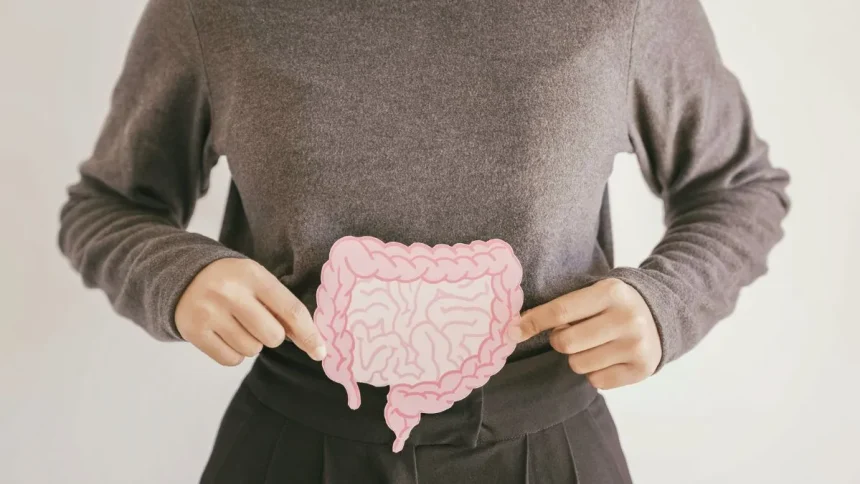Introduction
Dandruff, a common scalp condition characterized by flaking skin, can be both an embarrassing and irritating issue. While it’s often treated as a superficial problem, recent studies have shown a significant connection between gut health and scalp conditions like dandruff. Understanding this link can help you address the root cause of dandruff and improve your overall health. This blog will delve into how gut health impacts dandruff, the causes of poor gut health, and actionable steps you can take to enhance both your digestive and scalp health.
What is Gut Health?
Gut health refers to the balance and functionality of microorganisms in your digestive system. These microorganisms, primarily bacteria, play a crucial role in digestion, nutrient absorption, and immune function. A healthy gut contains a diverse range of beneficial bacteria and immune cells that help fend off infectious agents like bacteria, viruses, and fungi. It also communicates with the brain through nerves and hormones, which helps maintain general health and well-being.
Importance of Gut Health
- Digestion and Absorption: Proper digestion and absorption of nutrients are dependent on a healthy gut. Without a balanced gut microbiome, the body can’t efficiently extract and absorb vital nutrients from food.
- Immune System Function: About 70% of the immune system is located in the gut. A healthy gut helps regulate the immune response and prevent infections.
- Mental Health: The gut-brain axis is a bidirectional communication system between the gut and the brain. A healthy gut can positively impact mood and cognitive function.
How Does Gut Health Affect Your Scalp?

The connection between gut health and skin conditions, including dandruff, is becoming increasingly evident. An imbalance in gut bacteria, also known as dysbiosis, can lead to systemic inflammation, which can manifest in various skin issues, including dandruff. Here’s how poor gut health can contribute to scalp problems:
Inflammation
An imbalanced gut microbiome can cause the immune system to overreact, leading to chronic inflammation. This inflammation doesn’t just stay in the gut; it can spread throughout the body, including the skin and scalp. Inflammation of the scalp can disrupt the natural shedding process of skin cells, leading to the formation of dandruff.
Nutrient Deficiencies
A compromised gut may not absorb nutrients effectively. Nutrients such as zinc, B vitamins, and essential fatty acids are crucial for maintaining healthy skin and hair. Deficiencies in these nutrients can contribute to a flaky, itchy scalp.
Yeast Overgrowth
The gut microbiome helps keep yeast and fungi in check. An imbalance can allow yeast, such as Malassezia (a fungus commonly found on the scalp), to grow unchecked, leading to dandruff.
Causes of Poor Gut Health
Several factors can contribute to an imbalance in gut bacteria, leading to poor gut health. Understanding these causes can help you take proactive steps to improve your gut health and, consequently, your scalp health.
Poor Diet
A diet high in processed foods, sugars, and unhealthy fats can harm the gut microbiome. These foods can promote the growth of harmful bacteria and yeast, leading to an imbalance.
Stress
Chronic stress can negatively impact gut health by altering gut motility and increasing intestinal permeability, also known as “leaky gut.” This condition allows toxins and bacteria to enter the bloodstream, causing inflammation.
Antibiotics
While antibiotics are essential for treating bacterial infections, they can also disrupt the balance of beneficial bacteria in the gut. Overuse or misuse of antibiotics can lead to long-term gut health issues.
Lack of Sleep
Poor sleep quality can affect the gut microbiome by disrupting the body’s natural rhythms and reducing the diversity of gut bacteria.
Sedentary Lifestyle
Physical inactivity can negatively impact gut health by reducing the diversity of the gut microbiome and increasing inflammation.
Signs of Poor Gut Health
Recognizing the signs of poor gut health can help you take early action to restore balance and prevent further complications. Common symptoms include:
- Digestive Issues: Bloating, gas, constipation, and diarrhea are typical signs of an unhealthy gut.
- Fatigue: Chronic tiredness or fatigue can be linked to poor gut health.
- Skin Problems: Acne, eczema, and dandruff can indicate gut health issues.
- Food Intolerances: Difficulty digesting certain foods may suggest an imbalance in gut bacteria.
- Unintentional Weight Changes: Gaining or losing weight without changes in diet or exercise can be a sign of gut health problems.
- Frequent Infections: A compromised gut can weaken the immune system, leading to more frequent colds and infections.
What is Dandruff?
Dandruff is a condition where the scalp sheds excessive amounts of dead skin cells. This shedding can be accompanied by itching and irritation. Dandruff is often a chronic condition, but it can be managed with proper care and treatment.
Common Causes of Dandruff
- Dry Skin: Dry skin is a common cause of dandruff. The flakes from dry skin are usually smaller and less oily.
- Oily Skin: Known as seborrheic dermatitis, this condition is characterized by red, greasy skin covered with flaky white or yellow scales.
- Yeast Overgrowth: Malassezia, a yeast-like fungus that feeds on oils on the scalp, can cause dandruff when it grows out of control.
- Sensitivity to Hair Products: Some people may react to certain hair care products, leading to a red, itchy, and scaly scalp.
- Poor Hygiene: Infrequent shampooing can cause oil and skin cells to build up on the scalp, leading to dandruff.
Connection Between Gut Health and Dandruff
The link between gut health and dandruff is rooted in the gut-skin axis, a concept that describes the relationship between the gut microbiome and skin health. Here’s how poor gut health can lead to dandruff:
Systemic Inflammation
An unhealthy gut can cause systemic inflammation, which can manifest in the skin. Inflammatory conditions such as dandruff are often exacerbated by inflammation stemming from the gut.
Immune System Dysfunction
A significant portion of the immune system is located in the gut. When the gut is unbalanced, the immune system can become overactive, leading to inflammatory skin conditions like dandruff.
Hormonal Imbalances
The gut microbiome plays a role in regulating hormones. Hormonal imbalances can lead to excessive oil production on the scalp, providing an ideal environment for dandruff-causing yeast to thrive.
Improving Gut Health for Better Scalp
Improving your gut health can have a positive impact on your scalp and overall well-being. Here are some actionable steps to enhance gut health and reduce dandruff:
Eat a Balanced Diet
A diet rich in fiber, fruits, vegetables, lean proteins, and healthy fats can promote a healthy gut microbiome. Avoid processed foods, excessive sugar, and unhealthy fats.
Include Probiotics and Prebiotics
Probiotics are beneficial bacteria that can help restore gut balance. Prebiotics are non-digestible fibers that feed these beneficial bacteria. Include foods like yogurt, kefir, sauerkraut, kimchi, garlic, onions, and bananas in your diet.
Stay Hydrated
Drinking plenty of water supports digestion and helps maintain a healthy gut lining. Aim for at least 8 glasses of water per day.
Manage Stress
Chronic stress can harm your gut health. Practice stress-reducing activities such as meditation, yoga, deep breathing exercises, and regular physical activity.
Get Enough Sleep
Quality sleep is essential for gut health. Aim for 7-9 hours of sleep per night to allow your body and gut to repair and rejuvenate.
Avoid Unnecessary Antibiotics
Only use antibiotics when prescribed by a healthcare professional. Overuse of antibiotics can disrupt the balance of beneficial bacteria in your gut.
Exercise Regularly
Regular physical activity can enhance gut health by increasing the diversity of gut bacteria and reducing inflammation. Aim for at least 30 minutes of moderate exercise most days of the week.
Limit Alcohol and Caffeine
Excessive alcohol and caffeine can disrupt gut health. Limit your intake to maintain a balanced gut microbiome.
Probiotic Foods to Consider
Yogurt
Rich in live cultures, yogurt can help replenish beneficial bacteria in the gut.
Kefir
This fermented drink contains a diverse range of probiotics that support gut health.
Sauerkraut
Fermented cabbage is a great source of probiotics and can improve gut flora.
Kimchi
This spicy Korean dish is packed with probiotics and beneficial nutrients.
Miso
A traditional Japanese seasoning made from fermented soybeans, miso is rich in probiotics.
Prebiotic Foods to Consider
Garlic
Garlic is a powerful prebiotic that supports the growth of beneficial gut bacteria.
Onions
Onions contain inulin, a type of prebiotic fiber that nourishes gut bacteria.
Bananas
Bananas are a great source of prebiotic fiber, supporting gut health.
Whole Grains
Foods like oats, barley, and quinoa provide prebiotic fibers that promote a healthy gut.
Asparagus
Asparagus is rich in prebiotic fibers that help maintain a balanced gut microbiome.
Managing Stress for Better Gut Health
Meditation
Meditation can help reduce stress and promote relaxation, benefiting gut health.
Yoga
Yoga combines physical postures, breathing exercises, and meditation to reduce stress and improve overall health.
Regular Exercise
Engaging in regular physical activity can help reduce stress and support gut health.
Adequate Sleep
Prioritize sleep to reduce stress and allow your body and gut to recover and rejuvenate.
Natural Remedies for Dandruff
Tea Tree Oil
Tea tree oil has antifungal properties that can help reduce dandruff. Add a few drops to your shampoo.
Aloe Vera
Aloe vera soothes the scalp and reduces inflammation. Apply aloe vera gel directly to the scalp.
Apple Cider Vinegar
Apple cider vinegar balances scalp pH and has antifungal properties. Dilute with water and use as a rinse.
Coconut Oil
Coconut oil has moisturizing and antimicrobial properties. Apply to the scalp and leave for 20 minutes before washing.
Baking Soda
Baking soda can help exfoliate the scalp and reduce dandruff. Mix with water to form a paste and apply to the scalp.
When to See a Doctor
While many cases of dandruff can be managed with home remedies and lifestyle changes, there are times when you should seek professional help. If dandruff persists despite trying various treatments, consult a dermatologist. Additionally, if you experience severe gut issues such as chronic diarrhea, unexplained weight loss, or persistent abdominal pain, it’s essential to see a gastroenterologist.
Conclusion
The connection between gut health and dandruff highlights the importance of a holistic approach to health and wellness. By focusing on improving your gut health through a balanced diet, stress management, adequate sleep, and regular exercise, you can significantly reduce the risk of dandruff and other skin conditions. Remember, a healthy gut is the foundation for a healthy body and mind. Take proactive steps today to nurture your gut and enjoy the benefits of improved overall health and a dandruff-free scalp.
Follow us on Social Media: https://www.facebook.com/timelinetale1?mibextid=ZbWKwL







